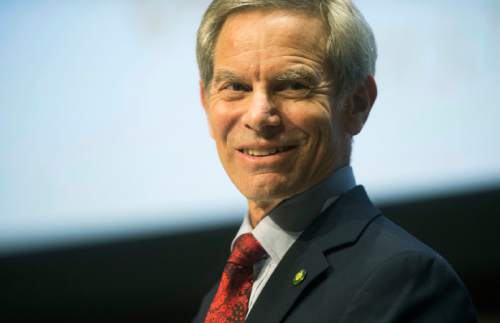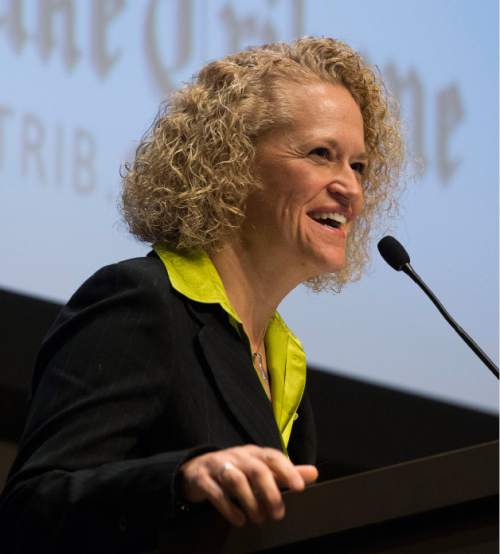This is an archived article that was published on sltrib.com in 2015, and information in the article may be outdated. It is provided only for personal research purposes and may not be reprinted.
How much is too much when it comes to money in political campaigns in Salt Lake City?
In the runup to the Nov. 3 election, Mayor Ralph Becker spent $863,439, while challenger Jackie Biskupski spent $536,420. That's a total of $1,399,859.
The Salt Lake City Council will chew on that Tuesday at its afternoon work session in a discussion focusing on further limiting campaign contributions.
The nearly $1.4 million spent in the mayoral race equates to $36.71 per vote of the 38,126 ballots cast.
The last unofficial vote count had Biskupski at 17,290 to Becker's 15,840. Results on the remaining 4,996 votes will not be publicly disclosed until Nov. 17.
However, if each candidate were to receive half of the uncounted votes, Biskupski would have spent $27.10 per vote compared to $47.08 for Becker.
Council Chairman Luke Garrott has long sought stricter limits on cash contributions in Salt Lake City political races. Garrott, who was one of three candidates who did not survive the Aug. 11 mayoral primary, refused corporate money.
Earlier this fall, the grass-roots organization Move to Amend approached the council with a proposal to limit personal contributions to $500 in mayoral and council races. Corporate donations would be banned.
Individuals or corporations can donate as much as $7,500 in a mayoral race. In City Council elections, the limit is $1,500.
These caps apply only to Salt Lake City. Utah law contains no limits on campaign contributions.
Move to Amend Utah is one of 61 chapters of a national movement that wants to undo the 2010 U.S. Supreme Court ruling in the case of Citizens United v. the Federal Election Commission. That opinion opened the floodgates for unlimited corporate money and union spending on federal and state political campaigns.
Councilwoman Erin Mendenhall said Monday that the council must be careful to not hamper contributions so much that it would eliminate candidates whose financial resources are limited.
"It would be a shame if they could not participate because they couldn't raise enough money to have their voices heard," she said. "If that threshold is eliminated, we'll end up with a homogeneous body made up of wealthy and older people."
The council's staff has prepared a report that outlines options to limiting campaign fundraising. Those options include limiting contributions from individuals, eliminating contributions from corporations and nonprofits, restricting carry-over campaign funds from previous years, and banning contributions from any entity doing business with Salt Lake City.
The council may be amenable to eliminating rollover from campaign funds raised in previous races, Mendenhall said, as well as corporate donations. She added, however, that banning corporate contributions could be difficult because those entities could ask individuals to donate in their place.
According to the council staff's report, campaign finance data from the 2003, 2007 and 2011 mayoral races reveal that winning candidates spent $30 per vote on average.
Those figures also show that successful mayoral candidates received $540 on average from each contributor. Subtracting corporate donations would take that number down to $230.
Although City Council races reflect fewer voters and cost less to run, the issue remains the same.
Councilman Charlie Luke, who won re-election Nov. 3, according to the unofficial vote count, said he has similar concerns to those voiced by Mendenhall.
Under federal law, "we cannot limit how much an individual can spend on his or her campaign," he said. "If you limit everybody else ... I worry a lot about that."
In Council District 4, Derek Kitchen spent $26,640 and got 2,137 votes in the unofficial tally. Also in that race, Nate Salazar spent $18,222 and received 1,997 votes in the unofficial vote count. How many of the uncounted ballots are from District 4 is not known.
If the vote totals were to remain as they are, Kitchen would have spent $12.46 per vote compared to $9.12 for Salazar. The average expenditure for a successful campaign in District 4 from races in 2003, 2007 and 2011 is $6.18 per vote, according to the report.
The average donation during those same elections for a successful campaign in District 4 was $82.
The contributions from for-profit and nonprofit companies in District 4 for those campaigns was equivalent to 20 percent of a successful candidate's total campaign contributions.
The council's work session begins at 4:30 p.m. at City Hall, 451 S. State.
State dinged for campaign laws
Utah was given a D- grade Tuesday for its accountability and transparency laws by the Center for Public Integrity. It was 25th among the 50 states. One of the reasons for the low grade was its complete lack of campaign contribution limits. See the full report here: http://bit.ly/1iPtZYG





